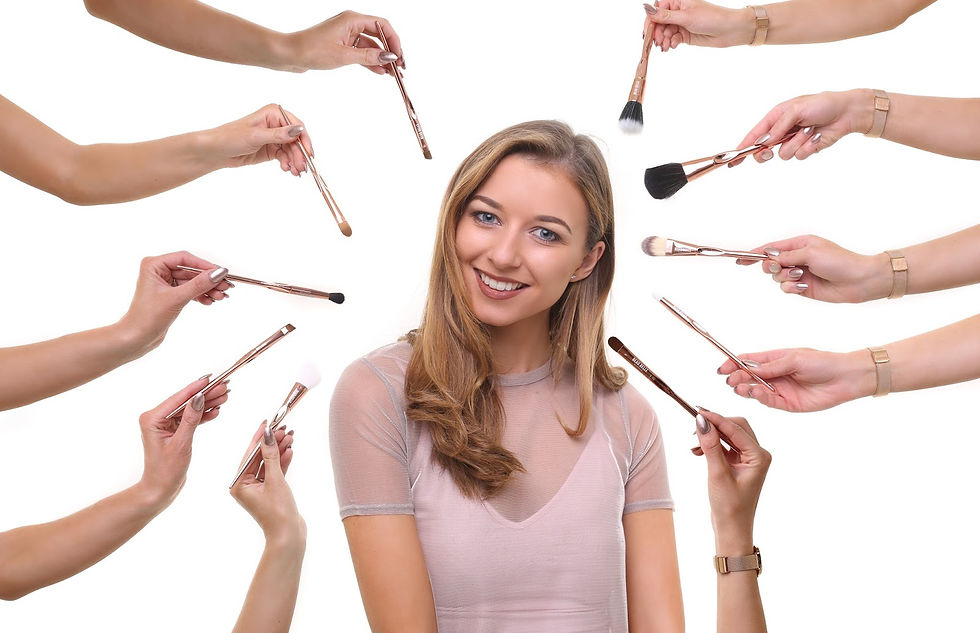Mastering Your Personal Beauty Routine with ELTORIA
- Hinton Magazine

- Sep 12, 2025
- 3 min read
In the second instalment of Hinton Magazine’s four-part series with ELTORIA, Curtis Hinton turns the spotlight onto the art of the personal beauty routine. Where once a skincare line-up was little more than soap and moisturiser, it has now become a ritual, even a cultural marker. But beyond the noise of trends and the pressure of aesthetics, what does it mean to build a routine that is both personal and powerful? ELTORIA brings a refreshingly honest perspective: one that places intention, balance, and authenticity above performance. This conversation dives into the essentials of what makes a beauty ritual truly work – stripping back the excess, cutting through the marketing gloss, and asking how routine can become ritual without losing sight of individuality.

Routines have become rituals, even status symbols. What, to you, makes a beauty routine meaningful rather than performative?
A beauty routine should be for you, not for anyone else. It’s meaningful when it makes you feel grounded, confident, or cared for - whether that’s a five-step skincare ritual or simply washing your face at night. When the intention is self-nourishment instead of external validation, it becomes something powerful rather than performative.
If you stripped it back to the essentials, what’s the framework for a routine that actually works?
When you strip it back, a beauty routine that actually works comes down to three things: cleansing, protecting, and nourishing. Clean skin is the foundation, protection (like SPF) keeps it healthy long-term, and nourishment - whether through moisturizer, hydration, or whatever feels good, makes it sustainable. Everything beyond that is an enhancement, but those essentials create a routine that truly supports you.
Is “more” always better, or can a pared-down routine sometimes deliver greater results
Less is often more. When routines get too complicated, they can become overwhelming - and that’s when consistency falls away. A pared-down routine that feels realistic and achievable is far more powerful, because it’s the one you’ll actually stick to.
How do you separate what your skin genuinely needs from what trends tell you it should have?
I’ll admit, I love trying new trends! But at the end of the day, the most important thing is listening to your skin. What works for someone else may not work for you, and tuning into your skin’s unique needs always matters more than following the latest craze.
What common habits silently sabotage even the most expensive routines?
Skipping your SPF! Sun damage undermines even the best routines. Even overlooking basics like sleep, hydration, and removing your makeup can quietly undo all the effort you put on top.
Does a routine have to evolve with age, lifestyle, or even the city you live in?
I’m 32 now, and my routine looks very different than it did at 22. Back then it was simple, but now I’ve added things like retinol, red light therapy, and eye cream. I definitely think routines naturally evolve with age and lifestyle, and even where you live can influence what your skin needs.
How important is consistency versus innovation - sticking with staples versus chasing the new?
I think consistency is the foundation - your skin really thrives when you give it stability with products and habits that work. At the same time, innovation is exciting and sometimes brings real breakthroughs. For me, it’s about having core staples I never skip, and then selectively introducing something new if it truly adds value. For example, when my skin was looking red, I added a Niacinamide serum into my routine, and it made a big difference.
If beauty is personal, how can someone design a routine that truly reflects who they are?
I think the best routines start with understanding your own needs - your skin type, your lifestyle, even what makes you feel confident. From there, it’s about choosing products and rituals that feel authentic to you. For example, if you’re all about sustainable beauty, shop from brands that support that. Some people love a 10-step routine because it’s their self-care time, while others thrive with just three products that really work. A routine that reflects who you are should feel sustainable, enjoyable, and aligned with your values.
What emerges from ELTORIA’s reflections is a reminder that beauty routines are less about the shelves of serums and more about self-understanding. Consistency and simplicity trump complexity; protection and nourishment beat fleeting trends. A meaningful routine isn’t built on external validation but on what makes you feel confident and cared for. As this second conversation in our series shows, mastering your beauty routine isn’t about keeping up, it’s about tuning in. And with two more interviews still to come, the exploration of personal style and self-expression is only just gathering momentum.
_edited.jpg)












Comments